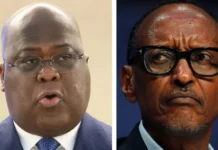The United Kingdom and Germany signed a historic agreement to deepen defence cooperation and crack down on illegal immigration, marking the first official visit to the UK by German Chancellor Friedrich Merz.
British Prime Minister Keir Starmer announced that Merz had committed to amending German law this year to allow authorities to seize small boats used by people smugglers transporting migrants across the English Channel. “It’s a clear sign that we mean business in every way,” Starmer said, though Berlin has not yet confirmed when the legislation will be enacted.
The bilateral meeting, held at the Victoria and Albert Museum and later at Downing Street, also saw the signing of the first-ever UK-Germany “friendship treaty,” dubbed the Kensington Treaty. The agreement strengthens military cooperation, formalises a mutual defence pledge, and seeks to bolster post-Brexit ties between the two countries.
Under the deal, the UK and Germany will jointly promote exports of military equipment such as Boxer armoured vehicles and Typhoon jets, potentially worth billions of pounds, and commit to developing a new precision strike missile with a range of over 2,000 kilometres within the next decade.
On the issue of undocumented migration, which has become politically volatile in the UK, the two leaders pledged closer coordination to dismantle smuggling networks. More than 22,500 migrants have reached England’s southeastern coast by small boats from France this year alone.
Starmer said changing German law would allow police there to target storage facilities and warehouses used by smugglers to stash boats intended for Channel crossings. The pledge follows a similar push by French President Emmanuel Macron during his state visit to the UK last week. Merz is expected to host Macron in Germany next week to further discuss migration and regional security.
The leaders also announced a school exchange programme exempt from visa requirements and agreed to improve train links between the two nations. Chancellor Merz welcomed plans for a new direct Eurostar route between London and Frankfurt by the early 2030s.
Speaking in German, Merz praised the importance of fostering youth connections. “Allowing the younger generation to get to know one another and each other’s countries is a good basis for the future development of our relations,” he said.
On global security, both countries reaffirmed their support for Ukraine and expressed interest in participating in a NATO-backed initiative led by U.S. President Donald Trump to finance weapon supplies to Kyiv.
Despite past Brexit tensions, Merz acknowledged that Germany, France, and the UK were increasingly aligned on critical issues. “I personally deplore Brexit,” he said, “but we are now converging on key policies, migration, defence, and regional stability.”
Written By Rodney Mbua



















